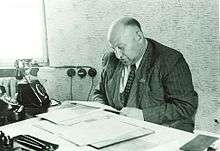Hirsch Schwartzberg
Hirsch Schwartzberg (Szwarcberg, Schwarzberg) (28 October 1907, in Vilna[1] — 17 October 1987 in Ashdod) was a Jewish leader of Holocaust survivors (Yiddish: בפרייטה יידין אויף ברלין) under the American occupation of Berlin.
Hirsch Schwartzberg | |
|---|---|
 Schwartzberg in the Düppel-Center Office | |
| Born | 28 October 1907 Vilnius (Vilna), Russian Empire |
| Died | 17 October 1987 (aged 79) Ashdod, Israel |
| Monuments | YIVO |
| Nationality | Polish, American |
| Occupation | truck business, Jewish DP leader, farmer in Vineland, New Jersey, USA |
| Known for | Leading Holocaust surviving Jewish refugees in Berlin |
| Political party | none |
| Spouse(s) | Rivkah Schwartzberg |
He was president of the Central Committee of Jewish Displaced Persons in Berlin. He controlled activities of two adjoining displaced-person camps in Berlin, in Düppel and Mariendorf.[2] As a witness remembers, in the years of his leadership there was no riots or violence in the camps.[3]
All of Schwartzberg's family were killed in the World War II German genocide of European Jews, except himself, and his wife and son. They together survived the Vilna Ghetto. A couple weeks before its final liquidation, in September 1943, they escaped its liquidation, together with a few hundred other Jews from the ghetto, by gaining a work-permit for working in Karl Plagge's hastily expanded HKP 562 forced labor camp on Subačiaus Street in Vilnius. HKP562 served a few workshops (that were spread out through Vilnius) one primary task was for the conversion of smaller trucks to use wood as fuel. At the workshop to which Schwartzberg was assigned he served as their spokesperson.
Albeit the survival rate at HKP562 was higher than in the liquidated Vilna ghetto, Plagge and some of his more benevolent officers could not avert the outcome, and most of the Jewish workers of the HKP were later also liquidated mainly by Ukrainian and Estonian SS in July 1944 before the Russians occupied Vilna/Vilnius. Schwartzberg, with wife and son, survived this liquidation by switching to new hiding places during the night, as their previous ones got discovered and those caught then murdered. Most of these hiding places were makeshift and often overfilled, which increased their likelihood of discovery.
For the Schwartzbergs and other surviving Jews the subsequent Soviet occupation was a liberation. But Vilnius/Vilna, before the German invasion, was a predominately Polish and Jewish city but after the genocide in Lithuania, the Vilna Jewish society and community to which Schwartzberg previously belonged did not exist anymore. Thus after the Schwartzbergs recuperated, and as the Red Army proceeded west-ward towards Berlin, Schwartzberg and his family also left Vilnius and moved west. To the city of Szczecin in Poland, and then three weeks after the German capitulation, to Berlin. An additional important calculation in Schwartzberg's decision to leave Vilna, his hometown, was also to avoid the forced migration east of many people in Lithuania by the Soviets, including surviving Jews. For a related reason, he lied about his place of birth, as being Lodz, Poland, on arriving into East Berlin. The Soviets had the policy then of repatriating people from the Baltics, often also shipping them further east. For this reason he took the additional precaution of misinforming the Soviets about his place of birth and that of his wife and child.
In February 1949 Schwartzberg, and his wife and son, immigrated to the United States.[4][5]
References
- "Passport to Nowhere: The Story of a Great Truck Driver" (2nd page), by Gertrude Samuels, The Canadian Jewish Review, 19 November 1948; originally from the New York Times Magazine, 19 September 1948, (retrieved 30 Nov 2012)
- "Passport to Nowhere: The Story of a Great Truck Driver" (2nd page), by Gertrude Samuels, The Canadian Jewish Review, 19 November 1948; originally from the New York Times Magazine, September 19, 1948, (retrieved 30 Nov 2012)
- "Rabbi Mayer Abramowitz - The Jewish Federation of North America". Archived from the original on 2013-09-27. Retrieved 2012-10-10.
- "DP CHIEF ARRIVES IN LAND OF CHOICE; Modern 'Solomon' Who Helped Thousands in Camps Weeps With Happiness on Dock" , The New York Times, 17 February 1949
- "HAVING OWN ROOM ELATES DP LEADER; Hirsch Schwartzberg Sees Symbol of Freedom in His First Privacy in Years", The New York Times, 18 February 1949